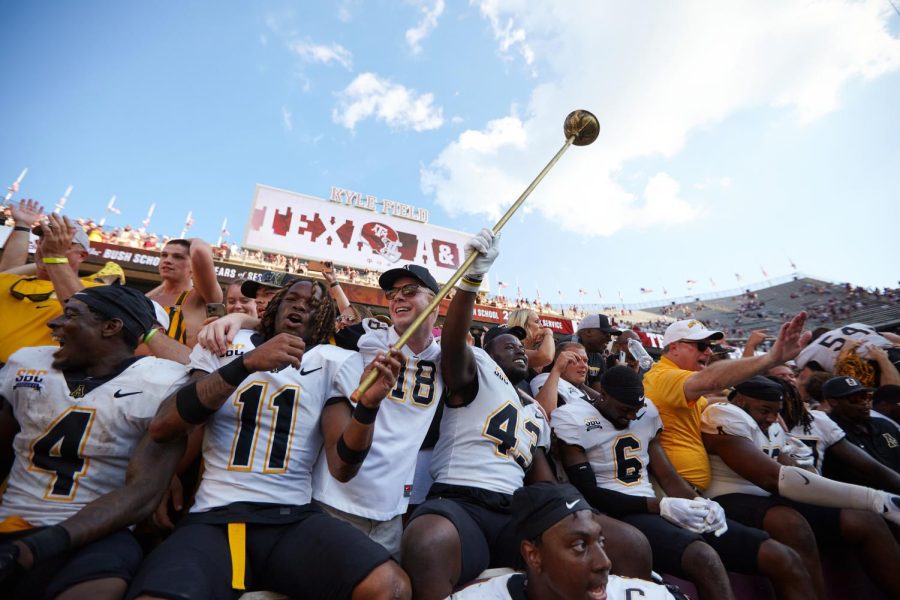From Ann Arbor to College Station: The rise of Mountaineer football
Courtesy of Andy McLean, App State Athletics
Several Mountaineers celebrate their historic victory over No. 6 Texas A&M Sept. 10, 2022.
November 17, 2022
As the clock hit zero on Sept. 10 in College Station, App State took down another top 10 team on the road, 15 years after the historic win against Michigan.
As the season nears its end, players and fans have since gotten a chance to look back at the game that shocked the college football world and how the Mountaineers carry the legacy.
“I would say that Appalachian State Football looked smaller, even simpler 15 years ago, but the heart of the team and our fans has never changed,” said James Jestes of House United, a group of alumni from 2009.
2005 – 2007
The university had already seen success at the Football Championship Subdivision level before 2005, with multiple 10-win seasons and Southern Conference Championships under head coach Jerry Moore.
“The core of what makes Appalachian State so special has been the constant and is the real reason for its success: family,” Jestes said. “It’s always been about family since coach Jerry Moore came to Boone.”
Even without national recognition after multiple championships, the fanbase knew there was something special about Mountaineer football.
“Remarkably, the football program is very much the same, even back into the ‘80s,” Jestes said. “The only differences are the number of fans in the stands, visibility on television, social media and the production of the product on the field.”
In 2005, however, the team won the first of three back-to-back national championships.
“I feel like Coach Moore took it up another level during that time to start proving who Appalachian was,” said former player Corey Lynch.
Lynch played safety for the Mountaineers and had a pivotal role in the win at Michigan, blocking the Wolverines’ game-winning field goal attempt in the final seconds.
Heading into 2007, the Mountaineers were coming off two national championship wins and were preparing to open the season against the No. 5 Michigan Wolverines.
“We felt very confident that we were a good team, but we weren’t expecting to win, I don’t think,” Lynch said.
Before the game, a ranked Football Bowl Subdivision team had never lost to an FCS team. Later that day, App State became the first.
“They can only put 11 guys on the field against our 11, and we think we can play with anybody in the country,” Lynch said. “And you know, that was true that day.”
Mental preparation remained a key focus for the coaching staff to build up to the game.
“Our strength coach at the time, he would play that Michigan fight song in the weight room for practice during workouts to the point where we were so sick and tired of hearing it,” said former running back Devon Moore. “Leading up to it, we tried not to let too much noise and stuff as far as the media and what they were saying affect us.”
Following the win, students in Boone took to the streets in celebration.
“They went to the stadium and tore down the field goal post; it was ecstatic. It was fun to be on campus,” said Ryan Wixted, a student in 2007 who was in Boone to experience the celebration. “It was something that had never been done before at the college level.”
The university went on to win the 2007 FCS National Championship. In 2012, the team parted ways with longtime coach Jerry Moore, moving to the FBS and Sun Belt Conference two years later.
2014 – 2019
The Mountaineers adjusted quickly to the FBS, sharing the Sun Belt Championship in 2016 and 2017. In 2018, however, the team came close to taking down No. 10 Penn State and won their first outright conference championship in the inaugural Sun Belt Conference Championship.
Following the championship win, head coach Scott Satterfield left the program. Eliah Drinkwitz took over, heading into one of the Mountaineer’s most successful years since 2007.
“Coach Drinkwitz’s culture was about winning on and off the field and doing things better than they’d ever done,” said Kaiden Smith, defensive back for the Mountaineers from 2016-21.
No longer an FCS underdog, App State once again had opportunities to prove itself with games scheduled against North Carolina and South Carolina in 2019. Naturally, the Mountaineers won both.
“It’s pretty exciting to see how that kind of tradition carries on and kind of see what the coaches can get out of the place,” said Xavier Subotsch, starting punter for the Mountaineers from 2019-21. “I think just that that’s a tradition of trying to leave the place, you know, better than better than you found it.”
The win at Chapel Hill, once again thanks to a blocked field goal, marked the Mountaineers’ first win against a Power Five program since Michigan. Likewise, the win over South Carolina would be the first victory over a Southeastern Conference opponent.
“It was the peak of our powers; it was the reason we finally beat those Power Five teams and got over that hump,” Smith said. “Would confidently take that team against just about anybody, and long story short, we had a bunch of dogs.”
Both wins helped establish the university as not just a good Group of Five program with a memorable upset win but a football team genuinely capable of dispatching Power Five programs and honoring the teams that came before.
“Knowing what Coach Moore built back in the day and what he was trying to achieve, I think they’ve done a great job of making sure that guys are aware of the history and can live up to that,” Subotsch said.
The Mountaineers would go on to win 13 games in 2019 and claim the Sun Belt title, losing Drinkwitz to Missouri. Shawn Clark, a position coach at the time, stepped in as head coach. Like Satterfield, Clark was a former football player, having played for the Mountaineers in the ‘90s.
“They know the history and tradition of App State and their work ethic, they know about the town, they know about the team,” said Moore on having former players lead the program. “I think that’s what’s been instrumental in keeping this team traditionally good year in and year out.”
Lynch shared a similar sentiment, appreciating that Clark has been able to find success as an “insider.”
After the 2019 season, the program would receive several renovations, with the focal point being Kidd Brewer Stadium.
“The winning culture, the team camaraderie and leadership, the off-season and in-season mentality, and the emphasis on winning never changed,” Smith said. “But thankfully, all of those culminated and led to many of the changes we see now with the new facility, more national attention, more big wins, and more.”
2022
With head coach Shawn Clark now at the helm for two seasons and appearing in his first Sun Belt Championship in 2021, there was more to be accomplished for the 2022 season.
From the outside looking in, the 2022 season was a tough test for the Mountaineers, with early season games against North Carolina and Texas A&M. Within the locker room, the team was prepared for what laid ahead.
“Most of them big games, they have a bigger name than us, but every week we’re coming in working no matter who our opponent is and trying to go 1-0,” said Daetrich Harrington, redshirt senior running back.
The “1-0” mentality was brought in by Clark and continues to be a focal point every day during a week of preparation before a game.
“Keep pushing, 1-0 mentality; coach Clark says it daily in the meetings,” said Isaiah Helms, junior offensive lineman.
Clark is a former All-American offensive lineman for the Mountaineers and pushes lineman like Helms to their furthest to become better every day.
This mental toughness was brought into College Station against No. 6 Texas A&M and resulted in the Mountaineer’s biggest win since 2007 in Ann Arbor. This seemed like another miracle to the fans, but it was a culmination of what the players were building.
“Brick by brick,” Helms said. “It won’t happen overnight; we must keep working every day and getting better and better.”
The result was historic, with students once again celebrating in the streets, calling back to the victory over Michigan 15 years prior. ESPN’s College GameDay announced they were coming to Boone later that evening.
“It finally gets us to that point where we have this ability, and we have the talent and tradition and culture where we can beat these teams consistently,” said Bailey Lang, president of the Student Yosef Club. “Instead of getting just close enough, we have the ability to finish it out.”
Despite the excitement, the preparation remained the same for any opponent the Mountaineers faced.
“Every game is the same; we gotta lock in and stay focused,” Harrington said.
As the season wraps up, players will be playing their final snaps of college football after the countless practices and games they’ve given to the program and each other.
“You’re with your brothers,” Helms said. “You’re only guaranteed one more play.”
With Senior Day, players wish to utilize the opportunity to give it their all one last time in front of the Mountaineer fans.
“I’m going to be ready to give it my all like it’s my last game, my last play,” Harrington said. “I can’t wait to come out to my last game and give a show.”
Like the fans, the players have had the opportunity to not only help the program grow and change, but also develop themselves and their teammates into leaders.
“Back in the day, I was a younger guy just watching it as a player, and now I’m leading the way, so it has changed a lot,” Harrington said.
Like the growth the program has seen since the mid-2000s, the Mountaineers will continue to see new changes and memories, but players intend to keep the culture of App State football strong.
“It’s a culture they’ve instilled from the previous teams. So it’s an amazing tradition, and you try to keep going,” Helms said.















Glenn • Nov 21, 2022 at 3:21 pm
Nice article Briggs